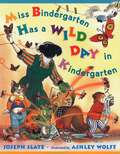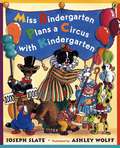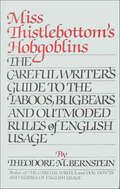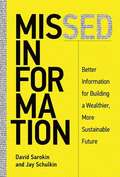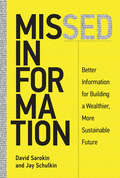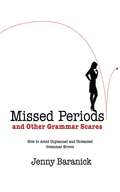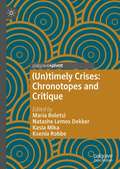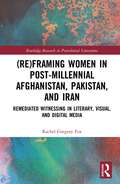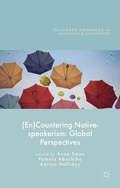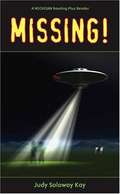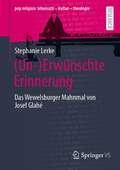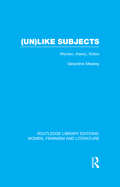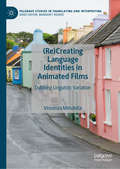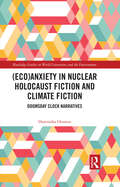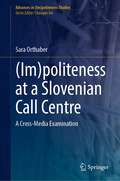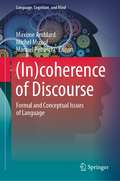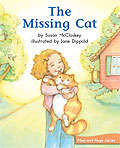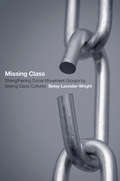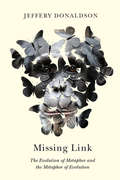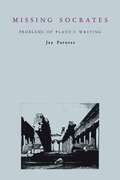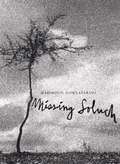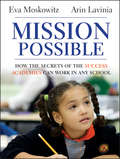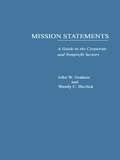- Table View
- List View
Miss Bindergarten Has a Wild Day In Kindergarten (Miss Bindergarten Bks.)
by Joseph SlateThings are always a little rowdy in a class of twenty-six kindergartners, but there are some days when chaos reigns. Watch what happens in Miss Bindergarten's rambunctious class when water overflows, ants are on the loose, and oozy paint smudges. How will Miss Bindergarten and the kindergartners get everything back in order? This is one kindergarten adventure not to be missed!
Miss Bindergarten Plans a Circus With Kindergarten (Miss Bindergarten Bks.)
by Joseph SlateMiss Bindergarten is planning a circus and all of her kindergarteners are in on the fun! Everyone is busy preparing: painting posters, practicing somersaults, and making popcorn balls. When at last the big day arrives, there will be a parade, complete with clowns and stunts, from baton twirling to "high-wire" walking. And for the grand finale, Miss Bindergarten will give the audience a spectacular, show-stopping act!
Miss Thistlebottom's Hobgoblins: The Careful Writer's Guide to the Taboos, Bugbears and Outmoded Rules of English Usage
by Theodore M. BernsteinOnce you recall that Miss Thistlebottom was your elementary-school teacher who laid down all manner of taboos concerning the use of language, you will have an idea of what this book is about. In no sense permissive or radical, it topples the taboos that lack historical, logical or grammatical basis. It is a refreshing look at our living language, the perfect companion to the author's indispensable work, The Careful Writer.Mr. Bernstein writes four letters to Miss Thistlebottom that divide the book into four sections: "Witchcraft in Words," "Syntax Scarecrows," "Imps of Idioms," and "Spooks of Style." Can there be more than two "alternatives"? You'll find the answer in the Words section. Can something "grow smaller"? Ditto. How about Split Infinitives: is it proper to ever split one? Is "none" invariably singular? Take a look in the Syntax section. Isn't it absurd to say "if worst comes to worst" rather than "if worse comes to worst" or to say "head over heels" rather than "heels over head"? The section on idioms will enlighten you on these "absurdities." And then, is a preposition a proper word to end a sentence with? The section on Style will show you that some authoritarians don't know what they are talking about and don't know what rules are for.The scores and scores of entries in this book are crisp, lightly written and amply provided with illustrative material. They are designed to help anyone who writes anything--the student, the reporter, the copy editor, the professional writer-cast off the inhibitions and prohibitions that lack validity and cramp his writing style.An Appendix includes some rare, out-of-print sources of some of the bogies: William Cullen Bryant's Index Expurgatorius for writers on the old New York Post, James Gordon Bennett's "Don't List" for writers on the old New York Herald and Ambrose Bierce's blacklist Write It Right.
Missed Information: Better Information for Building a Wealthier, More Sustainable Future
by David Sarokin Jay SchulkinInformation is power. It drives commerce, protects nations, and forms the backbone of systems that range from health care to high finance. Yet despite the avalanche of data available in today's information age, neither institutions nor individuals get the information they truly need to make well-informed decisions. Faulty information and sub-optimal decision-making create an imbalance of power that is exaggerated as governments and corporations amass enormous databases on each of us. Who has more power: the government, in possession of uncounted terabytes of data (some of it obtained by cybersnooping), or the ordinary citizen, trying to get in touch with a government agency? In Missed Information, David Sarokin and Jay Schulkin explore information -- not information technology, but information itself -- as a central part of our lives and institutions. They show that providing better information and better access to it improves the quality of our decisions and makes for a more vibrant participatory society.Sarokin and Schulkin argue that freely flowing information helps systems run more efficiently and that incomplete information does just the opposite. It's easier to comparison shop for microwave ovens than for doctors or hospitals because of information gaps that hinder the entire health-care system. Better information about such social ills as child labor and pollution can help consumers support more sustainable products. The authors examine the opacity of corporate annual reports, the impenetrability of government secrets, and emerging techniques of "information foraging." The information imbalance of power can be reconfigured, they argue, with greater and more meaningful transparency from government and corporations.
Missed Information: Better Information for Building a Wealthier, More Sustainable Future
by David Sarokin Jay SchulkinHow better information and better access to it improves the quality of our decisions and makes for a more vibrant participatory society. Information is power. It drives commerce, protects nations, and forms the backbone of systems that range from health care to high finance. Yet despite the avalanche of data available in today's information age, neither institutions nor individuals get the information they truly need to make well-informed decisions. Faulty information and sub-optimal decision-making create an imbalance of power that is exaggerated as governments and corporations amass enormous databases on each of us. Who has more power: the government, in possession of uncounted terabytes of data (some of it obtained by cybersnooping), or the ordinary citizen, trying to get in touch with a government agency? In Missed Information, David Sarokin and Jay Schulkin explore information—not information technology, but information itself—as a central part of our lives and institutions. They show that providing better information and better access to it improves the quality of our decisions and makes for a more vibrant participatory society.Sarokin and Schulkin argue that freely flowing information helps systems run more efficiently and that incomplete information does just the opposite. It's easier to comparison shop for microwave ovens than for doctors or hospitals because of information gaps that hinder the entire health-care system. Better information about such social ills as child labor and pollution can help consumers support more sustainable products. The authors examine the opacity of corporate annual reports, the impenetrability of government secrets, and emerging techniques of “information foraging.” The information imbalance of power can be reconfigured, they argue, with greater and more meaningful transparency from government and corporations.
Missed Periods and Other Grammar Scares
by Jenny BaranickGrammar has finally let its hair down! Unlike uptight grammar books that overwhelm us with every single grammar rule, Missed Periods and Other Grammar Scares is like a bikini: it's fun, flirty, and covers only the most important bits. Its lessons, which are 100 percent free of complicated grammar jargon, have been carefully selected to include today's most common, noticeable errors--the ones that confuse our readers or make them wonder if we are, in fact, smarter than a fifth grader. What is the proper use of an apostrophe? When should an ellipsis be used instead of an em dash? Why do we capitalize President Obama but not "the president"? And why is that question mark placed outside of the end quote? Author Jenny Baranick is an English professor whose students can't believe she's actually that into grammar. Upon experiencing the joys of grammar at an early age, raising grammar awareness became Jenny's raison d'être. By spreading her remarkably user-friendly and hilarious approach to grammar, she hopes everyone will experience the satisfaction of a properly placed comma, a precisely used semicolon, and a correctly deployed en dash.Missed Periods and Other Grammar Scares shows grammar as it's never been seen before: uncomplicated, laugh-out-loud funny, and, dare we say, a little risqué.
**Missing**: Chronotopes and Critique (Palgrave Studies in Globalization, Culture and Society)
by Maria Boletsi Natashe Lemos Dekker Kasia Mika Ksenia RobbeUn)timely Crises explores how ‘crisis’—as a narrative, concept, grammar, and experience—structures time and space. This collectively written volume extends Bakhtin’s ‘chronotope’ to challenge mobilizations of crisis within neoliberal governmentality. The book explores how contemporary crises can trigger memories and traumas of earlier events as well as foster practices of resistance and alternative visions of the future. Drawing from across disciplines and geographical contexts, (Un)timely Crises reimagines the relation of ‘crisis’ with ‘critique’, proposing future trajectories for thinking and living in and through crisis.
**Missing**: Remediated Witnessing in Literary, Visual, and Digital Media (Routledge Research in Postcolonial Literatures)
by Rachel Gregory FoxThis book critically examines the representational politics of women in post-millennial Afghanistan, Pakistan, and Iran across a range of literary, visual, and digital media. Introducing the conceptual model of remediated witnessing, the book contemplates the ways in which meaning is constructed, deconstructed, and reconstructed as a consequence of its (re)production and (re)distribution. In what ways is information reframed? The chapters in this book therefore analyse the reiterative processes via which Afghan, Pakistani, and Iranian women are represented in a range of contemporary media. By considering how Muslim women have been exploited as part of neo-imperial, state, and patriarchal discourses, the book charts possible—and unexpected—routes via which Muslim women might enact resistance. What is more, it asks the reader to consider how they, themselves, embody the role of witness to these resistant subjectivities, and how they might do so responsibly, with empathy and accountability.
**Missing**: Global Perspectives (Palgrave Advances in Language and Linguistics)
by Adrian Holliday Anne Swan Pamela AboshihaThe book addresses the issue of native-speakerism, an ideology based on the assumption that 'native speakers' of English have a special claim to the language itself, through critical qualitative studies of the lived experiences of practising teachers and students in a range of scenarios.
Missing!
by Judith KayWhen high school students in the small midwestern town of Oakton start disappearing, police are left without any clues until a psychic named Serena Sills begins working on the case. Serena and Police Chief Matt Williams combine detective work and supernatural intuition as they try to find the missing teenagers before it's too late. The MICHIGAN Reading Plus Readers are original fiction written for students who wish to improve their reading skills. The MICHIGAN Reading Plus Readers support the need for extensive reading on topics of interest to today's students. The Readers offer students books in the genres of mystery, science-fiction, and romance. Activities that practice vocabulary and reading skills are provided on the companion website.
**Missing**: Das Wewelsburger Mahnmal von Josef Glahé (pop.religion: lebensstil – kultur – theologie)
by Stephanie LerkeAngesichts des Verstummens von Zeitzeug:innen und des Wiedererstarkens fremdenfeindlicher Motive und Mechanismen wie Antisemitismus, Rassismus und Rechtspopulismus ist Erinnerung an den Holocaust aktueller denn je. Gedenkstätten wie die „Erinnerungs- und Gedenkstätte Wewelsburg 1933 – 1945“ nahe Paderborn stellen in der gesellschaftlichen Erinnerungskultur als bildungspolitische Orte zur Erinnerung an die Opfer des Nationalsozialismus und der Mahnung an die leidvollen Ereignisse unter der nationalsozialistischen Diktatur eine notwendige Möglichkeit hierfür dar. Um sich mit dieser politisch sensiblen Geschichte und ihren aktuellen Erscheinungsformen auseinanderzusetzen, bedient sich die Wewelsburg des Ausdrucksmittels Kunst. Als erste umfassende interdisziplinäre Grundlagenforschung befasst sich dieses Buch mit jenem einzigartigen Stück bundesdeutscher Kunstgeschichte nach 1945, einer bildgewordenen, (un-)erwünschten Erinnerung aus einer theologischen Perspektive. Stephanie Lerke zeigt auf, dass das nachkriegsexpressionistische Wewelsburger Mahnmal von Josef Glahé den Betrachtenden durch sein breites Bildprogramm ein komplexes Themenfeld von historischen und theologischen Inhalten mit aktueller, erinnerungspolitischer Relevanz eröffnet. Sie verdeutlicht, wie dieses „zeitlose“ Medium mit seiner Fülle an Interpretationsspielräumen und Gegenwartsbezügen zur individuellen Spurensuche und Auseinandersetzung mit lebendiger Geschichte einlädt.
**Missing**: Women, Theory, Fiction (Routledge Library Editions: Women, Feminism and Literature)
by Gerardine MeaneyWhat is the relationship between feminist critical theory and literature? This book deals with the relationship between women and writing, mothers and daughters, the maternal and history. It addresses the questions about language, writing and the relations between women which have preoccupied the three most influential French feminists and three important contemporary British women novelists. Treating both fiction and theory as texts, she traces the connections between the theorists – Hélène Cixious, Luce Irigaray and Julia Kristeva – and the novelists – Doris Lessing, Angela Carter and Muriel Spark. This reading of the work of these six major women writers explores new forms of women’s identity, subjectivity and narrative and demonstrates how theoretical and literary texts can illuminate each other to bridge the gap between theory and literary criticism.
**Missing**: Dubbing Linguistic Variation (Palgrave Studies in Translating and Interpreting)
by Vincenza MinutellaThis book describes the dubbing process of English-language animated films produced by US companies in the 21st century, exploring how linguistic variation and multilingualism are used to create characters and identities and examining how Italian dubbing professionals deal with this linguistic characterisation. The analysis carried out relies on a diverse range of research tools: text analysis, corpus study and personal communications with dubbing practitioners. The book describes the dubbing workflow and dubbing strategies in Italy and seeks to identify recurrent patterns and therefore norms, as well as stereotypes or creativity in the way multilingualism and linguistic variation are tackled. It will be of interest to students and scholars of translation, linguistic variation, film and media.
**Missing**: Doomsday Clock Narratives (Routledge Studies in World Literatures and the Environment)
by Dominika Oramus(Eco)Anxiety in Nuclear Holocaust Fiction and Climate Fiction: Doomsday Clock Narratives demonstrates that disaster fiction—nuclear holocaust and climate change alike—allows us to unearth and anatomize contemporary psychodynamics, and enables us to identify pre-traumatic stress as the common denominator of seemingly unrelated types of texts. These Doomsday Clock Narratives argue that earth’s demise is soon and certain. They are set after some catastrophe and depict people waiting for an even worse catastrophe to come. References to geology are particularly important—in descriptions of the landscape, the emphasis falls on waste and industrial bric-a-brac, which is seen through the eyes of a future, post-human archaeologist. Their protagonists have the uncanny feeling that the countdown has already started, and they are coping with both traumatic memories and pre-traumatic stress. Readings of novels by Walter M. Miller, Nevil Shute, John Christopher, J.G. Ballard, George Turner, Paolo Bacigalupi, Maggie Gee, Ruth Ozeki and Yoko Tawada demonstrate that the authors are both indebted to a century-old tradition and inventively looking for new ways of expressing the Pre-TSS common in contemporary society. This book is written for an academic audience (postgraduates, researchers and academics) specializing in British Literature, American Literature, and Science Fiction Studies.
**Missing**: Doomsday Clock Narratives (Routledge Studies in World Literatures and the Environment)
by Dominika Oramus(Eco)Anxiety in Nuclear Holocaust Fiction and Climate Fiction: Doomsday Clock Narratives demonstrates that disaster fiction— nuclear holocaust and climate change alike— allows us to unearth and anatomise contemporary psychodynamics and enables us to identify pretraumatic stress as the common denominator of seemingly unrelated types of texts. These Doomsday Clock Narratives argue that earth’s demise is soon and certain. They are set after some catastrophe and depict people waiting for an even worse catastrophe to come. References to geology are particularly important— in descriptions of the landscape, the emphasis falls on waste and industrial bric- a- brac, which is seen through the eyes of a future, posthuman archaeologist. Their protagonists have the uncanny feeling that the countdown has already started, and they are coping with both traumatic memories and pretraumatic stress. Readings of novels by Walter M. Miller, Nevil Shute, John Christopher, J. G. Ballard, George Turner, Maggie Gee, Paolo Bacigalupi, Ruth Ozeki, and Yoko Tawada demonstrate that the authors are both indebted to a century- old tradition and inventively looking for new ways of expressing the pretraumatic stress syndrome common in contemporary society. This book is written for an academic audience (postgraduates, researchers, and academics) specialising in British Literature, American Literature, and Science Fiction Studies.
**Missing**: A Cross-Media Examination (Advances in (Im)politeness Studies)
by Sara OrthaberThis volume covers the field of linguistic (im)politeness in a particular mediated, customer-oriented setting. It is the first book to do so across telephone, email and social media. It offers key insights into a unique customer service setting through authentic and spontaneous data analysis. The book looks at how customers and agents of a large public transport company engage in transactional services and impolite behaviour. This text is directed at scholars and practitioners working in communication, business discourse, (socio)pragmatics, interaction studies, and social media interactions. It is also of great value to students in applied linguistics and scholars of Slavic languages, particularly Slovenian. The cross-media study is also of value to public/private institutions to reflect on their work practices, helping them improve existing customer–service provider relationships. The diverse readership and appeal are essential features of this book.Examines mediated institutional talk and impoliteness in the Slovenian languageCovers mediated service interactions, such as requests and complaints across three different mediaProvides in-depth insights into communication within a contemporary business environment
**Missing**: Formal and Conceptual Issues of Language (Language, Cognition, and Mind #10)
by Manuel Rebuschi Michel Musiol Maxime AmblardThis present book explores recent advances in modeling discourse processes, in particular, new approaches aimed at understanding pathological language behavior specific to schizophrenia. The contributors examine the modeling paradigm of formal semantics, which falls within the scope of both linguistics and logic while providing overlapping links with other fields such as philosophy of language and cognitive psychology. This book is based on results presented during the series of workshops on (In)Coherence and Discourse organized by SLAM (Schizophrenia and Language: Analysis and Modeling), a project developed to systemize the study of pathological language processing by taking an overarching interdisciplinary approach combining psychology, linguistics, computer science and philosophy. The principle focus is on conversations produced by people with psychiatric disorders such as schizophrenia and autism. The contributions come from young and experienced researchers, and invited speakers. The book appeals to likeminded students and researchers.
The Missing Cat (Fountas & Pinnell LLI Green #Level I, Lesson 97)
by Susan MccloskeyFountas and Pinnell Leveled Literacy Intervention Green System -- 1st Grade
Missing Class
by Betsy Leondar-WrightMany activists worry about the same few problems in their groups: low turnout, inactive members, conflicting views on racism, overtalking, and offensive violations of group norms. But in searching for solutions to these predictable and intractable troubles, progressive social movement groups overlook class culture differences. In Missing Class, Betsy Leondar-Wright uses a class-focused lens to show that members with different class life experiences tend to approach these problems differently. This perspective enables readers to envision new solutions that draw on the strengths of all class cultures to form the basis of stronger cross-class and multiracial movements. The first comprehensive empirical study of US activist class cultures, Missing Class looks at class dynamics in 25 groups that span the gamut of social movement organizations in the United States today, including the labor movement, grassroots community organizing, and groups working on global causes in the anarchist and progressive traditions. Leondar-Wright applies Pierre Bourdieu's theories of cultural capital and habitus to four class trajectories: lifelong working-class and poor; lifelong professional middle class; voluntarily downwardly mobile; and upwardly mobile. Compellingly written for both activists and social scientists, this book describes class differences in paths to activism, attitudes toward leadership, methods of conflict resolution, ways of using language, diversity practices, use of humor, methods of recruiting, and group process preferences. Too often, we miss class. Missing Class makes a persuasive case that seeing class culture differences could enable activists to strengthen their own groups and build more durable cross-class alliances for social justice.
Missing Link
by Jeffery DonaldsonWe look for missing links in the sciences and humanities, but the essential missing link - metaphor - is always in front of us. In Missing Link, Jeffery Donaldson unites literary criticism and evolutionary and cognitive science to show how metaphor has been with us since the beginning of time as a seed in the nature of things. With examples from centuries of poets, critics, philosophers, and scientists, he details how metaphor is a chemistry, an exchange of energies forming and dissolving, and an openness in the spaces between things. He considers the ways in which DNA learns how to liken things that have been, how mutation makes errors and then tries them on, and how evolution is hypothesis - nature's way of "thinking more." The mind is a matrix of relations: neural synapses cascade into ever-changing pathways and patterns. Metaphor is the substance of things hoped for, the evidence of things not seen. It is the unbroken thread between matter and spirit. Whether offering analysis of a turn of phrase or chemical reaction, Missing Link presents a vision of literature that is also a vision of the cosmos, and vice versa. It enters the debate between evolution and religion, and challenges scientists, literary theorists, and religious advocates to rethink the relations between their disciplines.
Missing Link: The Evolution of Metaphor and the Metaphor of Evolution
by Jeffery DonaldsonWe look for missing links in the sciences and humanities, but the essential missing link - metaphor - is always in front of us. In Missing Link, Jeffery Donaldson unites literary criticism and evolutionary and cognitive science to show how metaphor has been with us since the beginning of time as a seed in the nature of things. With examples from centuries of poets, critics, philosophers, and scientists, he details how metaphor is a chemistry, an exchange of energies forming and dissolving, and an openness in the spaces between things. He considers the ways in which DNA learns how to liken things that have been, how mutation makes errors and then tries them on, and how evolution is hypothesis - nature's way of "thinking more." The mind is a matrix of relations: neural synapses cascade into ever-changing pathways and patterns. Metaphor is the substance of things hoped for, the evidence of things not seen. It is the unbroken thread between matter and spirit. Whether offering analysis of a turn of phrase or chemical reaction, Missing Link presents a vision of literature that is also a vision of the cosmos, and vice versa. It enters the debate between evolution and religion, and challenges scientists, literary theorists, and religious advocates to rethink the relations between their disciplines.
Missing Socrates: Problems of Plato's Writing (G - Reference, Information and Interdisciplinary Subjects)
by Jay FarnessPlato's conversations of Socrates are among the most accessible philosophical texts most of us have ever read, yet the more one pursues the art or intelligibility of this writing, the more mysterious and paradoxical the Platonic texts become. What does it mean to study Plato, not philosophically as a maker of arguments, not poetically as a maker of dialogues, but literally as a maker of texts? This is a question that Jacques Derrida has made his own, and in this book Farness creates a dialogue with Derrida on Plato's texts.Missing Socrates also provides a dialogue between Plato and Socrates on the question of speech versus writing and a study of the materiality of Plato's writing. Included among the various dialogues and themes developed here are rhetoric and courtroom practice in the Apology of Socrates; religion, skepticism, and the idea of transcendence in the Euthyphro; artistic practice and tradition in the Ion; education and political discipline in the Charmides; and rhetoric, writing, commemoration, and the motives of authorship in Phaedrus. In each of these discursive settings, Socrates unsuccessfully seeks a place or a mode for philosophy; Farness shows that the dialogues of Plato uncannily supply that lack.
Missing Soluch: A Novel
by Mahmoud DowlatabadiPerhaps the most important work in modern Iranian literature, this starkly beautiful novel examines the trials of an impoverished woman and her children living in a remote village in Iran, after the unexplained disappearance of her husband, Soluch. Lyrical yet unsparing, the novel examines her life as she contends with the political corruption, authoritarianism, and poverty of the village. It follows her vacillations between love for Soluch and anger at his absence, and her struggle to raise her children without their father. The novel critically evokes the unfulfilled aspirations of modern Iran -- portraying a society caught between a past and a future that seems equally weighted down by injustice. This landmark novel -- poineering the use of the everyday language of the Iranian people --revolutionized Persian literature in its beautiful and daring portrayal of the life of a marginal woman and her struggle to survive. Missing Souluch is published with the support of the Association of American Publishers' Freedom-to-Publish Committee, assisting in the publication of voices censored by the U. S. State Department's ban on books from the "Axis of Evil. "
Mission Possible: How the Secrets of the Success Academies Can Work in Any School
by Eva Moskowitz Arin LaviniaStrategies for making the schools we need that work for all kidsEva Moskowitz (the founder and CEO of the Success Charter Network in Harlem) and Arin Lavinia offer practical, classroom-tested ideas for dramatically improving teaching and learning. Moskowitz and Lavinia reveal how a charter school in the middle of Harlem, enrolling neighborhood children selected at random, emerged as one of the top schools in New York City and State within three years. The results of the Harlem school were on a par with public schools for gifted students and elite private schools.Describes what can be accomplished when students and adults all work to focus on constant learning and performance improvement; DVD clips can be accessed using a special link included in the book.The Success Academies have been featured in two popular and widely distributed documentaries, Waiting for Superman and The LotteryDetails the Success Academies' THINK Literacy curriculum, which produces dramatic results in student's reading and writing skillsIn addition to providing strategies and lessons for school leaders and teachers, Secrets of the Success Academies also serves as a guide for parents, policymakers, and practitioners who are passionate about closing the academic achievement gap.
Mission Statements: A Guide To The Corporate And Nonprofit Sectors
by John W. Graham Wendy C. HavlickFirst published in 1994. Routledge is an imprint of Taylor & Francis, an informa company.
